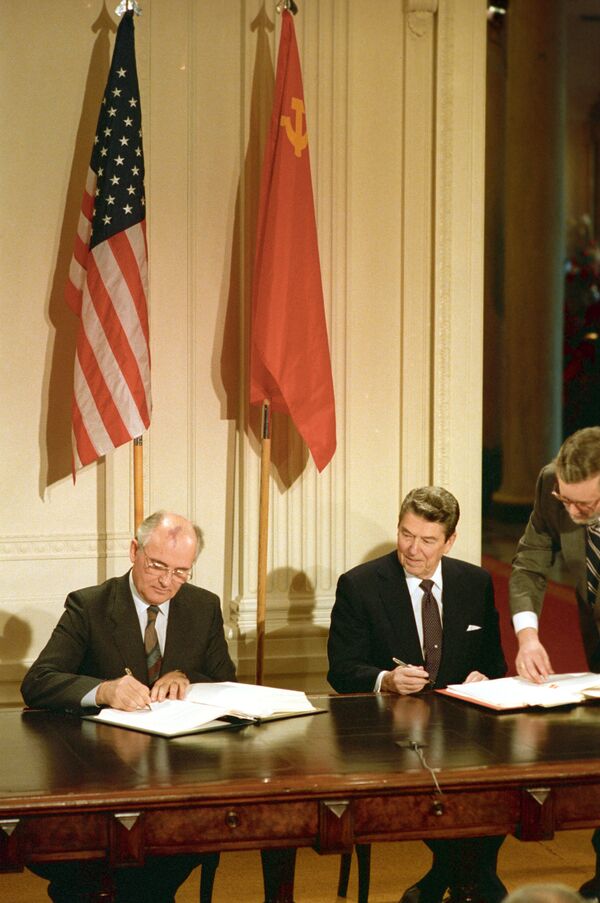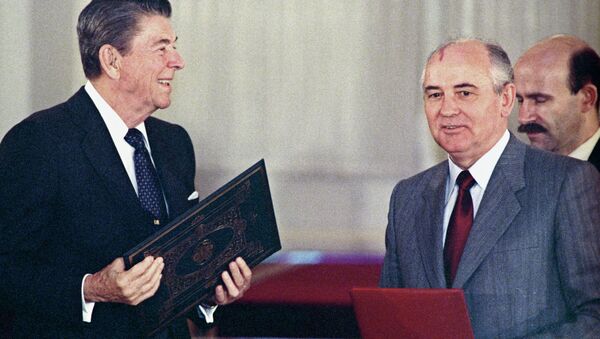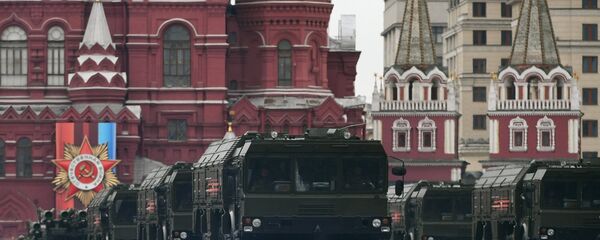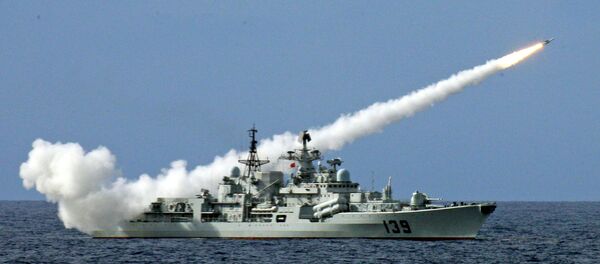"This is yet another concession to the military-security complex, which is feeding its huge profits with orchestrated fear of Russia, which is then used to secure support from the American people and Congress for more military spending to counter the 'Russian threat'," said Dr. Paul Craig Roberts, commenting on Donald Trump's intention to quit the Intermediate-Range Nuclear Forces (INF) Treaty. The American economist and author served as the US Assistant Secretary of the Treasury for Economic Policy under President Ronald Reagan.
The former Reagan administration official clarified that he does not think "that the military-security complex itself wants a war with Russia, but it does want an enemy that can be used to justify more spending." He explained that the withdrawing from the INF Treaty "gives the military-security complex a justification for a larger budget and new money to spend: manufacturing the formerly banned missiles."
"It is important to understand that the military-security complex is actually more powerful than the president of the US," Dr. Roberts pointed out. "As long ago as 1961, in his last public address, President Dwight Eisenhower warned the American people that because of the Cold War with the Soviet Union the military-security complex, instead of being dismantled after World War 2, had continued to grow and was becoming more powerful than the government itself."
"That was 57 years ago," he underscored. "You can imagine how much stronger the military-security complex is today."
Reagan Wanted to End the Cold War
In his recent op-ed for The Institute for Political Economy website, the author recalled that, behind the scenes, he had some role in the INF Treaty's development, as President Ronald Reagan appointed him to a secret presidential committee with subpoena power over the CIA at that time.
"President Reagan wanted to end the Cold War, not only because of its expense, but, more importantly, because the Cold War brought the risk of nuclear war," Dr. Roberts told Sputnik. "Reagan referred to nuclear weapons as 'those God-awful weapons,' and he wanted the world rid of them. All of Reagan's tough talk and threat of 'star wars' was designed to encourage the Soviets to end the Cold War."
The author recalled that in this effort, Reagan was opposed by the CIA, the military-security complex, and by the neoconservatives, who were committed to a unipolar world.
The agreement was signed on December 8, 1987, in Washington by then-General Secretary of the Communist Party of the Soviet Union Mikhail Gorbachev and then-US President Ronald Reagan. It was ratified by the US Senate on May 27, 1988 and came into force on June 1, 1988.
READ MORE: Key Milestones of Intermediate-Range Nuclear Forces Treaty US Mulls to Exit

What's Behind the Intention to Quit the INF Treaty?
"The Zionist Neoconservatives are responsible for Washington's unilateral abandonment of the INF treaty, just as they were responsible for Washington's unilateral abandonment of the ABM Treaty [in 2002], the Iran nuclear agreement, and the promise not to move NATO one inch to the East," the author suggested.
According to Dr. Roberts, the US neoconservatives have an ideology "akin to the German Nazi Party last century" — an ideology of American exceptionalism and supremacy.
"Their foreign policy goal was to prevent the rise of any other country that could serve as a check on US unilateralism," the economist said, evoking strong memories of the famous Wolfowitz Doctrine.
Dr. Roberts opined that US policy makers are seeking to weaponize the Russian opposition and "pro-Western elements" to exert pressure on Moscow into "accommodating Washington in order to have the sanctions removed." On the other hand, the Trump administration's new arms race could force Russia into spending more on defense, according to the author.
"Abrogating the INF Treaty, Washington thinks, will cause political pressures inside Russia, because it will cause more Russian military spending to take resources from other needs," the economist stressed, adding that Moscow needs to take a firm stance and not show weakness in the face of the assertive US strategy.
On October 20, US President Donald Trump signaled that he was willing to quit the INF Treaty, citing Russia's alleged violations of the agreement as his reason. On October 22, a Pentagon spokesman said that US Secretary of Defense James Mattis shares Trump's stance on the deal.
For its part, Moscow emphasized its opposition to the possible move, specifying that Washington had not launched the procedure for exiting the treaty so far.
The views and opinions expressed by the contributors do not necessarily reflect those of Sputnik.







